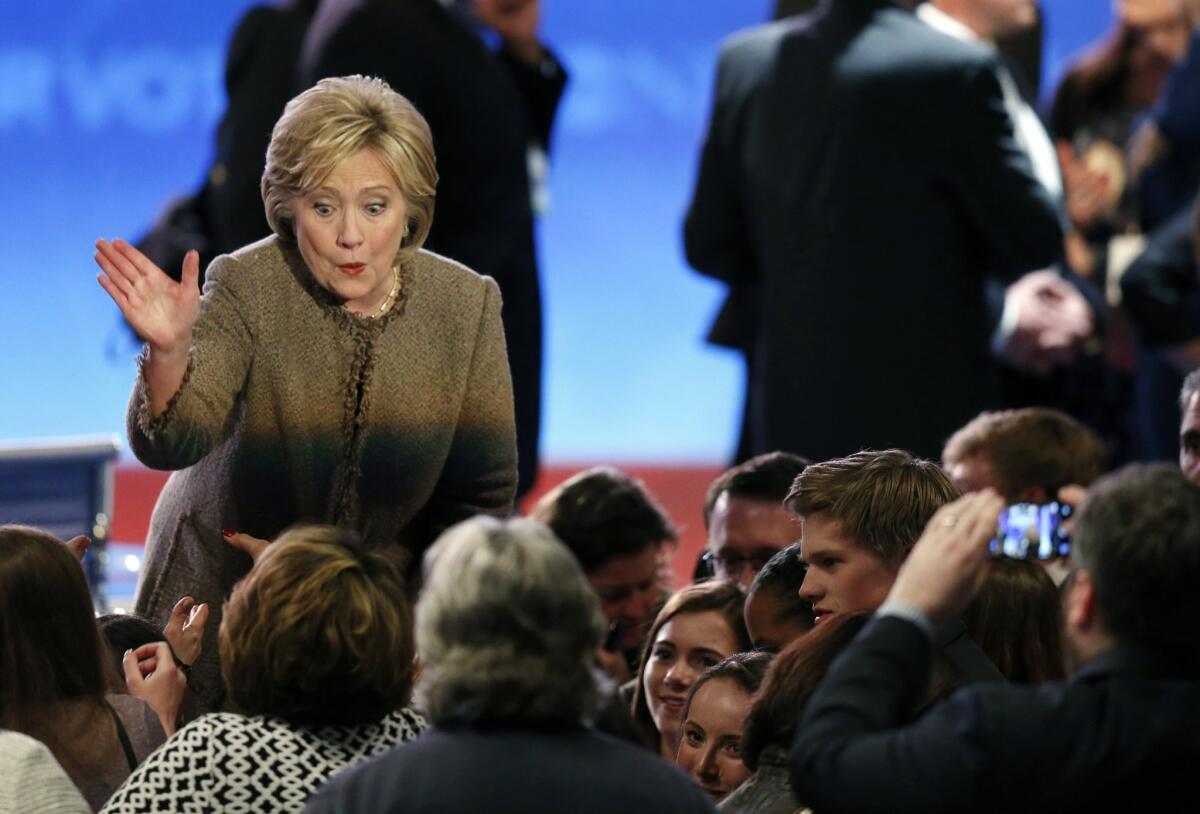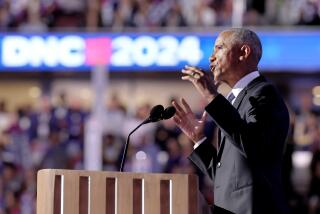Analysis:: Democratic contest winding down as GOP brawl escalates

Hillary Clinton greets supporters after a Democratic presidential primary debate in Manchester, N.H. Democrats and Republicans appear to have reached different points in their campaigns.
Reporting from Washington — The sharpest contrast between Tuesday night’s Republican presidential debate and Saturday’s Democratic face-off was not tone, although the difference was marked, or the number of candidates. It was the time horizon: While the GOP anxiously eyes February’s primaries, the Democrats already have shifted focus to November’s general election.
Their long view could be seen Saturday as former Secretary of State Hillary Clinton, the Democratic front-runner, and Sen. Bernie Sanders of Vermont, her main challenger, passed up chances to go on the attack:
Sanders apologized for his aides having raided the Clinton campaign’s voter files. Clinton said both campaigns should “move on” to other issues.
When Martin O’Malley criticized both of them for inconsistency on gun control, Clinton and Sanders defended each other. Clinton, having successfully bashed Sanders on gun issues for much of October and November, complimented him for altering his stand.
And when Clinton, eyes fixed firmly on the general election audience, talked tough about Syria, Iraq and Islamic State, Sanders said he worried that she might be “too aggressive” but acknowledged that it was a “complicated issue.”
“I don’t think anyone has a magical solution,” he said.
It’s not that Sanders has given up; He will certainly continue to push the issues that have mobilized the more than 2 million small-dollar donors who have financed his campaign. Already he can credibly say he has drawn the Democrats to the left on at least some parts of his agenda. But even though his aides have talked to reporters about potential attacks on Clinton, Sanders has made it clear by his actions in three successive debates that he has no desire to wage an all-out fight against the party’s presumptive nominee.
On the Republican side, meantime, the brawling is growing only more intense. Whether the party will remain together or split between its establishment wing and its Donald Trump faction remains an open question.
“Clinton is now on a glide path to the nomination, but the Republicans are just getting started,” said Dan Schnur, a veteran GOP strategist who now directs USC’s Jesse M. Unruh Institute of Politics.
For months, Republican operatives have speculated about whether Trump would run an independent campaign if he loses the GOP nomination. Now some have begun talking seriously about the opposite scenario: an establishment Republican running a third-party effort if Trump wins. Either way, the GOP could divide their presidential vote to the Democrats’ great advantage.
“Republicans could be in a disastrous state if Trump is nominated — I think unlikely — and frankly not much better off with” Sen. Ted Cruz of Texas, said Republican consultant Rob Stutzman, who helped guide former Gov. Arnold Schwarzenegger’s California gubernatorial campaigns.
But “the process is so unsettled” on the GOP side that multiple candidates remain possibilities for the nomination, he said.
“Republicans could be facing unprecedented disaster or success,” Stutzman said. “It’s clear as mud.”
Despite evidence to the contrary, Clinton campaign officials insist they are not taking their attention off the primaries.
“We are totally focused on this primary right now, first Iowa, then obviously here in New Hampshire where there’s a very tight race,” campaign manager Robby Mook told reporters Saturday night after the debate. “We’re focused on earning every single vote, every single delegate, and then we’ll worry about the general after that.”
But the candidate’s actions tell a different tale, seen most notably in her statements about combating Islamic State militants in Iraq and Syria, an issue that cuts across both parties to create odd de facto alliances.
Trump and Cruz, for example, agree with Sanders that the U.S. should seek a deal with Russia to fight Islamic State. To make that happen, they say, the U.S. should stop insisting that Syrian President Bashar Assad, whom Russia supports, must leave. Each also criticizes U.S. involvement in past efforts to overthrow dictators in the Mideast, including Saddam Hussein in Iraq and Moammar Kadafi in Libya.
Sen. Marco Rubio of Florida and Jeb Bush, the former Florida governor, agree with Clinton that opposing Assad needs to remain a priority. Each of them argues that the Sunni Arabs whose help the U.S. needs to battle Islamic State will cooperate only if they believe the U.S. is on their side in the fight against Assad, who is allied not only with Russia but also with their enemy Iran.
Each also supports a more vigorous version of the Obama administration’s policy, combining airstrikes and raids by U.S. special operations forces with a long-term effort to help Sunni groups fight for control of the territory in Syria and Iraq that Islamic State now rules.
But the dynamics of the Republican race, especially the competition to be as tough-sounding as Trump, have led the candidates to state their position in ever-harsher terms, such as Cruz’s call this month for “carpet-bombing” Islamic State territory.
Clinton, with relatively little worry about opposition from her party’s antiwar left wing, has been able to pitch to the less committed voters who, even in this partisan age, can swing key states. In Saturday’s debate, she advocated expanded use of special operations forces and an intensified air campaign, meeting only limited opposition from Sanders.
None of that means Democrats can stop feeling nervous about the fall. Republican disarray in December does not guarantee division in the general election campaign. Partisans on both sides have a strong tendency to pull together in the end, no matter what. And winning a third straight presidential election remains a difficult challenge.
“I still think this cycle is tougher for us than many on my side will acknowledge, mainly because we have become so dependent on a specific turnout coalition,” said Steve Schale, who ran President Obama’s successful campaign in Florida in 2008. “Take my home state. The smallest change in black turnout or Hispanic support changes the math in the wrong way.”
But Schale, who was active in the unsuccessful effort this fall to get Vice President Joe Biden to enter the race, joined GOP strategists in saying that the battle on the Democratic side has gone from being a threat to a useful warm-up round for the leader.
“Clinton,” he said, “has really upped her game the last few months.”
Times staff writer Michael A. Memoli in Manchester, N.H., contributed to this report.
More to Read
Get the L.A. Times Politics newsletter
Deeply reported insights into legislation, politics and policy from Sacramento, Washington and beyond. In your inbox three times per week.
You may occasionally receive promotional content from the Los Angeles Times.










